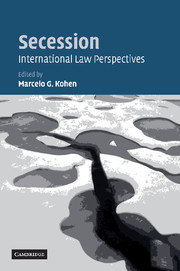Book contents
15 - Conclusions
Published online by Cambridge University Press: 23 July 2009
Summary
The State as a primary fact compelling acknowledgement by international law
The contemporary system of international law finds its origins in the new structure of power that emerged at the end of the wars of religion in Europe in the seventeenth century, a structure reflecting the rise of the new subjects of the international community of the time – the States – and their fundamental role in international relations. The legal system ensuing from this structure was thus assigned a precise and limited task: to confer legal sanction on the new basis of distribution of power in that community by legitimising State sovereignty, without, however, encroaching on it in any significant manner.
This explains the position of classical international law when faced with the phenomenon of the birth of a State. And while subsequent developments have changed many things in international law, they have only marginally affected this position, as we shall see further on.
Indeed, the State in the contemplation of international law is not a mere legal or ‘juristic’ person (personne morale), whose process of coming into being is prescribed by law. It is rather a ‘primary fact’, i.e. a fact that precedes the law, and which the law acknowledges only once it has materialised, by attributing certain effects to it, including a certain legal status. However, the law has no direct hold over the unfolding of the process that leads to the birth of the State; it can encourage or discourage its advent by means of inducement or dissuasion, as it did, for example, in encouraging the creation of an independent State in Namibia or in discouraging the existence of a racist State in Rhodesia – in other words, in acting on the probabilities and the effectivities.
- Type
- Chapter
- Information
- SecessionInternational Law Perspectives, pp. 470 - 476Publisher: Cambridge University PressPrint publication year: 2006
- 7
- Cited by

